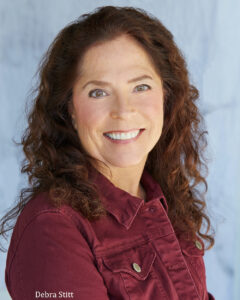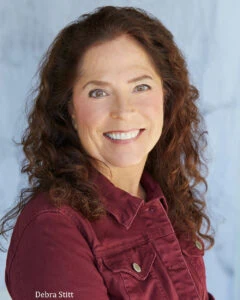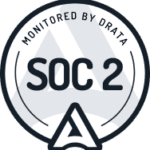
Debra Stitt is a North American voiceover artist providing professional services internationally from her South Florida Source-Connect Studio. You can hear her self-proclaimed ‘versatile, relatable, believable and pleasant’ voice in many, many, many brands & commercials!
Peter: So the first thing I wanted to talk about was, in researching this interview, I had a look at your Twitter and I love how you’ve got these videos of you voicing quotes. That’s such a great way to kind of get in front of people.
Debra: I used to just do the quote – find the quote then find a picture that I thought would kind of go with it. And then one day I’m like, ‘Why you dummy? You’re a voiceover artist. Why aren’t you voicing these?’ I thought it was a really good way to get my voice out there because rather than people having to find my website link to see what I sound like, they have something right there and then if they like it, then they can go to my website and hear more.
Peter: Nice. So where do you where do you kind of pluck those from? What inspires you to choose a particular quote?
Debra: It’s whatever strikes me. I might see something during the day in my travels around the web that strikes me and I’m like ”Ooh, that’s a good one.’ So I’ll pluck that. And recently – I know this may sound a little morbid, but it’s really not – it’s a way to honor people that have passed away that have had a meaningful place in life that have touched us. So I’ll Google them and find quotes from them and then do a series, maybe over a week of quotes that they’ve made.
Peter: I like that because like the older I get, the more I appreciate gathering bits of information from people who have kind of gone before. It’s like, yeah, I’ll happily take some of this hard-earned information from people as they move on, you know?
Debra: Yeah. Last week was my week to honour William Hurt, so all five days were William Hurt.
Peter: So one of the questions we ask everybody is how did you get started in this crazy biz?
Debra: It really all started when I was just a little bitty, tiny human. My mom caught me dancing around with my feet stuffed into her tea cups, doing pirouettes and little things, just performing. And she’s like, ‘I think I need to get this kid into dance school or something,’ because I was still too young to form sentences. So she started me off in dance school and I was a performer. I was a lead performer. I was a gymnast. So I did ballet and jazz and tap. And I was a baton twirler and I did all of that. And I ended up on stage and theater because of it. I was in choir and school. And even though I’m really shy about singing, I don’t like to do it, I won’t offer to do it, but they would always choose me to do a solo and I’m like, ‘ah, dang it.’ But it forces you to get outside of your comfort zone.
And I’m glad I did it because as time went on, you know, they wanted younger dancers. So I couldn’t do that anymore. And voice was something that was very appealing to me. So I got into voiceover. I do have to say I got into it a long time ago. Like when the broadcast boomy voice was very stylish. And they had cutting rooms for the tapes. So I had to relearn everything because I got out of it for a while and I got back into it when I moved to south Florida. South Florida’s a pretty big market. And now every place is a market! But I had to relearn everything, including how to be an editor. How to be a mixer. So now I can do all of that for my clients.
Peter: Well that leads into our next question: what kind of setup do you have at home?
Debra: I have a really good DAW called Studio One [by Presonus].
Peter: I love Studio One. That’s that’s what I use. It seems to work the way I think.
Debra: Ah, so you know! More and more voiceover artists are learning about Studio One. It’s a very powerful DAW. And what a lot of people don’t know is you can get the artist version for free if you buy a Presonus product. And that’s how I ended up with it, because my first interface was a Presonus interface. Cause when you first get started with all the editing and all the equipment, you’re trying to find stuff that’s good, but affordable, and it was like $99. And I still have it. It’s my backup. You can run over these things and they don’t break. But I got the Artist version free and I’ve now upgraded to the Professional version because it allows you to work on video as well.
Peter: Yeah cool! What about in terms of microphones?
Debra: I recently, Larry Hudson is a wonderful man and he recommended the Audio Technica AT875R for me. I was using a regular dynamic condenser mic but I live in a busy area so no matter how much room treatment I do, some of that bleeds through. And I’m in Florida so I’m on a cement slab, so the reverberation… a shotgun mic was just a much better option for me. I can point it right at my voice and the rest of it goes away.
Peter: And of course that must come in handy during the darkest days of the pandemic when no one could go to a studio anymore.
Debra: Exactly. Exactly. And I also have RX7 by the way, iZotope RX7 audio editor. So I I’m sure you’re familiar with that and that comes in very handy as well.
Peter: So how has the pandemic been for you work wise?
Debra: Well, thank goodness for voiceover. Because I actually own two businesses and I’ve tried to write my LinkedIn profile to incorporate the two businesses. I don’t actively pursue the other new clients in the other business anymore. I have so many clients that they come to me and if they give me a job, I work on it. And that was being an executive recruiter. And as you can imagine during the pandemic that didn’t happen, nobody was hiring. So it gave me an opportunity to really, really ramp up the voiceover work and spend a lot of time on my own direct marketing and perfecting my craft and more classes and all of that kind of stuff. So, you know, it’s been a double edged sword. It was a blessing on the one hand. And of course it’s been tragic on the other hand.
Peter: Yeah, I’ve lost friends to it, I’m sure a lot of people have.
Debra: The guy that did my first demo died, died a week ago. Right here, 30 minutes from me, he called his wife from the hospital to say ‘I’m bored, can you bring me my keyboard?’ and by the time she got to the hospital, he was gone.
Peter: Oh that’s awful.
Debra: And I had COVID last summer. I got sick the end of July and I was sick all the way through August. And it was horrible. Thank goodness I didn’t get the pneumonia. But I had everything else. I mean, absolutely everything else that comes with it. So I wasn’t able to work. I was down for a whole month.
Peter: Was it difficult to get started again after that?
Debra: Energy, regaining your energy, getting your strength back, getting your good voice back because if you’re tired, it shows in your voice. Yeah. I’m kind of a health nut, so I’m really careful about things anyways. So during the whole thing, I was doing things like making sure not to lie flat so that I wouldn’t get congested. I would elevate myself. I was doing something we have here in the States called Emergen-C. It’s a packet that’s loaded with vitamins and a lot of Vitamin C and it’s fizzy and you drink that. I was doing a lot of probiotic, prebiotics, black elderberry, all of that stuff. Any, anything I could get into me to fight virus.
Peter: I interview a lot of musicians and I’m always hearing about the stuff that singers have to do to maintain their voice, and there’s the cliche of the singers never helping out to lift all the stuff during load-in, but if a singer puts their back out or something, they’re not gonna be able to get that volume anymore and you’re gonna have a bad show.
Debra: Well I do have a really quick story, and this happened in my recruiting business but it transfers over to the voiceover too. There are some days when you just shouldn’t talk. And, and it could be based on just your mood. I had this wonderful candidate, fabulous, just perfect for the job called my client, I talked to my client and they’re like ‘I think we’re gonna pass.’ I’m like ‘Why?’ and they said ‘You just don’t sound excited about it today.’ I should not have been on the phone. I didn’t realize it and I pay attention to it now.
Peter: Yeah. And I mean, it just goes to show the power of the voice and unwritten information it carries. I guess you’re an expert at that!
Debra: Well, and singers and voiceover artists, it’s our job to move people. And we can move them in a lot of different directions and you need to make sure you’re moving them in a way that’s in line with your client’s needs.
Peter: So the next question I like to ask everyone is, what’s something that you learned the hard way that you wish you didn’t have to learn the hard way?
Debra: If you’re going to ask for help do your research, because voiceover it’s so broad. I always try to remember that we all started at the beginning, so to me, the only stupid question is a question that’s not asked. But the one thing that’s annoying is if you come to me and ask for help, but then you don’t wanna go do the work! Where you just keep tapping into me to do the work for you. A that’s taking up my time, but you’re really never gonna learn. And there were times when I should done more for my myself instead of asking for help. Like pay for a seminar, pay a little bit for a coach. There’s so much digging that you can do. And voiceover’s not cheap to get into. And people think it is, they think, uhmm “my friend told me I have a great voice and I should do VoiceOver”. Well, are you prepared to spend 10 grand?
Peter: Yeah. Another question that we’ve been asking everyone is what’s your perspective on gender and diversity in the industry at the moment?
Debra: I think people are hyperfocused. Instead of just being themselves, you know, I, I think if we just take a step back and not focus so much on that stuff and, and just focus on being ourselves and letting other people be themselves, whatever you’re doing, if it’s not hurting anybody, God bless you. You know, it just shouldn’t matter that much to us. That’s I know it’s a very, it’s a very political issue. It’s very polarizing. But I don’t really, I, I just don’t make judgements on that. I don’t make judgements on people based on their politics either. Hmm. If you’re a good person, I look at your heart. If you have a good heart, you’re my bud. Yeah. That’s what you wanted? Was that what you were trying to get to?
Peter: Everyone has a different answer. I’m really noticing and enjoying the more diverse range of voices we’re hearing in media in Australia now. Media sounds different to how it did 10, 15 years ago and more reflective of more of the people.
[At this point Peter’s cat Hermes Trismegistus interrupts the interview, as is his habit.]
Debra: Here is a story I’ve got to tell you. So I’m in my booth one day working on a project for a client and all of a sudden I’m hearing, I’m hearing like a strange rumble that, that I hadn’t heard before. It didn’t sound like a car going by or anything like that. It was my cat. He had snuck into my office before I closed it all up. And he was leaning up against my booth purring, like a madman.
Peter: That’s so cute.
Debra: Purring like a madman. So it was great. It was great.
Peter: What were you recording at the time?
Debra: I was recording something for a client. So how could you be mad? I mean, I had to redo it. Yeah. but it was okay because I caught it. I’m like, ‘What is that?’ Thank goodness it wasn’t during a Source-Connect session!
Peter: Tell me about using Source-Connect in your work.
Debra: Well, you know, one of the things I really love about it is you go in the booth, you get directed, they take the work, they do the editing. So you go in, you do it, you’re done. And it’s a great way to meet people. I think you’re more memorable to people when you do a session like with Source-Connect. The session I did yesterday, they wanted to do a test 30 minutes before the actual session, which I was grateful for because when they tested, they said I was sounding a little hot and could I adjust my gain? Just little things that people don’t necessarily think about unless they’re doing a session like with Source-Connect. And the lesson too is thank goodness I did the course. Because I had Source-Connect, I did the course because I was curious and I like learning. And A, there’s some good information in there, but B, I wanted to do it while you guys were running the special of doing the booth certification part of it. And thank goodness because had I not done that, I would not have realised that when I called our cable company I was having internet issues and they said they’d do a refresh of the internet signal, they didn’t just do a refresh. They did a complete reset It wiped out my port mapping. Had I not done that course? I would not have been ready for yesterday.
More info:
Debra Stitt
https://debrastitt.biz

